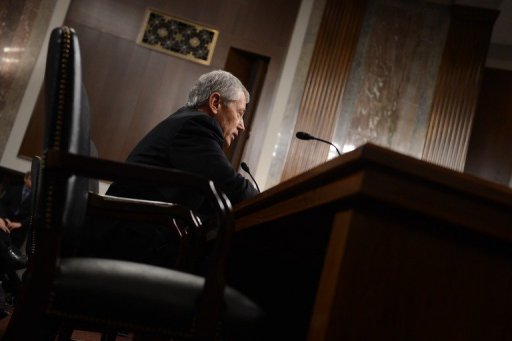Democrats’ latest defense of Chuck Hagel, whose confirmation as Secretary of Defense has bogged down in the Senate Armed Services Committee, is the argument that the Republicans are holding Hagel to a higher standard than any previous nominee. In fact, Republicans are only holding Hagel to the standard Democrats have applied to past nominees–and with far greater justification, given Hagel’s radical foreign policy views.
Hagel has refused to provide the committee with additional requested information about foreign funding to non-profit organizations and business entities with which he has been associated in the past decade. Hagel has also declined to comply with the committee’s request for more information about the “hundreds” of speeches he has given in recent years, saying that almost all of them were extemporaneous, private and unrecorded.
In response, over two dozen Republicans, led by Sen. Ted Cruz (R-TX), signed a letter indicating their conviction that the committee should not vote on recommending Hagel for confirmation by the Senate until he complies with all disclosure requests. The chair of the committee, Democrat Carl Levin of Michigan, postponed a vote that he hoped to have scheduled for Thursday, Feb. 7, and did not specify when the vote would occur.
On the day the vote was to have taken place, an evidently annoyed Levin told CNN that Republicans were judging Hagel by a double standard: “He’s been asked for things no prior candidate has been asked for,” Levin said. “He has provided all the financial information the rules of the committee require.” Yet Democrats have, in the past, asked for similar disclosures from nominees for posts involving defense and foreign policy.
Ten years ago, as the New York Post points out, Sen. Harry Reid demanded that former Secretary of State Henry Kissinger provide a list of all clients of his consulting firm as a condition for serving on the 9/11 Commission. And four years ago, as Ben Shapiro and Bill Kristol have both pointed out, the Clinton Foundation made public its list of foreign donors as Hillary Clinton faced confirmation hearings for the post of Secretary of State.
Hagel cites fiduciary responsibility as the reason he cannot disclose his foreign donors, yet he could ask the organizations in which he serves to waive those responsibilities. He appears to have made no effort to do so. Ironically, Sen. Chuck Schumer (D-NY), one of Hagel’s most important supporters, has championed the DISCLOSE Act–a bill that aims, in part, to end the secrecy surrounding donors to certain non-profit organizations.
There are also good reason why Hagel’s donors require special scrutiny. Some of his known donors, such as the Hariri family, have ties to foreign conflicts; Saad Hariri openly supports Hamas and the Syrian opposition. Hagel’s past views on a range of issues–unilateral nuclear disarmament, direct negotiations with Iran, pressure on Israel, and others–are so far outside the American mainstream that they invite further scrutiny.
If Hagel has nothing to hide, he should, as the Clintons did, welcome the opportunity to disclose his donors. If he does have something to hide, then he should simply not serve as Secretary of Defense. The position is not his by right, nor is it unfair discrimination to ask him to reassure the doubts of the opposition. “What are they trying to hide?” Reid asked of Kissinger and the Bush administration. The same question applies to Hagel.

COMMENTS
Please let us know if you're having issues with commenting.